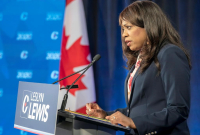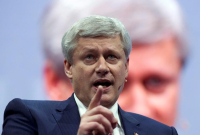Support strong Canadian climate journalism for 2025
Conservative MP Michelle Rempel Garner is warning that whoever is elected as the new party leader on Sunday must be prepared with robust policy for the West.
Considering the Liberal government was shut out of Alberta in the last election and a western separatist party is in the wings, the next Conservative leader needs more for the province than a pledge to axe the carbon tax, said Rempel Garner, an Calgary MP since 2011.
"That's how people will be making their decisions on how to vote in the next election in Alberta," she said.
None of the four leadership candidates have roots in the West, a first in the party's modern-day history.
The inaugural leader, Stephen Harper, was born in Ontario and moved to Alberta after high school. Rona Ambrose, who temporarily replaced him after he stepped down in 2015, was born and raised in the province.
Outgoing leader Andrew Scheer grew up in Ottawa, but has represented a Saskatchewan riding since 2004.
Rempel Garner was one of the few western MPs who considered a run at the top job. She said one of the reasons she opted not to run was the need to be an unabashed booster for her province.
After the Liberals lost what few seats they held in Alberta and Saskatchewan in the last election, Rempel Garner, with three other Conservative MPs, issued the "Buffalo Declaration."
It was billed as an outline of structural reforms designed to make Alberta an equal player in Confederation. She said she'd hoped candidates would take up its ideas as part of their respective platforms.
That didn't happen.
"That's why I've struggled with my vote," she said.
Leadership contender Erin O'Toole has a page in his platform devoted to Alberta, promising among other things to fix existing federal funding programs which top-up provincial revenues, a system that critics say can be unfair to Alberta.
Rival Peter MacKay references Alberta in his energy policy, an area where O'Toole attracted criticism for initially promising to remove subsidies on fossil fuels, though he later recanted.
Shannon Stubbs, who represents the central Alberta riding of Lakeland, agreed that the next leader has to get beyond promises to the oil and gas sector.
She said she wants a revival of conservative philosophy and positions and a more "substantial value proposition" for the province.
"More than just 'We support some jobs, or we support certain infrastructure or we are against certain laws or are against certain taxes,'" she said.
"I hope that the next leader and we as the Conservative party run on more than that for people from Alberta and the West."
Stubbs and Rempel Garner are among the few Alberta MPs who haven't publicly endorsed a candidate.
From the 33 Alberta MPs, MacKay has 13 endorsements and O'Toole 11, though he also counts among his backers Alberta Premier and former federal cabinet minister Jason Kenney.
Leslyn Lewis has the support of Alberta MP Glen Motz — who also signed the Buffalo Declaration — while Derek Sloan has no sitting MPs in his corner.
Lewis, however, has seen a marked rise in her grassroots support in Alberta. She trails just behind O'Toole when it comes to individual donors from the province, where he is the fundraising leader.
The number of Conservative party members overall has risen by about 100,000 during to the race to around 269,500.
Among the ridings with the most members in the country is Foothills, parts of which were once the Calgary political home of both Harper and Preston Manning, the founder of the Reform party.
The Reform party would later become the Canadian Alliance and then merge with the Progressive Conservatives to form today's Conservative party.
O'Toole has run in the spirit of the olden days, casting himself as a "True Blue" Tory.
But John Barlow, who currently represents Foothills, has endorsed MacKay, who was the leader of the PCs during the merger.
He said he feels the old-time Reformers in his riding want the same thing now as they did then: to win.
"What they are looking for is that leader who is going to beat Justin Trudeau, that leader who is going to win us seats in urban ridings, which we have to do," he said.
But, many are seeing echoes of the Reform days in the formation of a new political party based in Alberta: Wexit. It is calling for either the West to separate or for major constitutional reform to give it more clout and is currently led by Jay Hill, who spent 22 years as an MP, including as Harper's government House leader.
Rempel Garner stopped short of saying she'd cast her lot in with Wexit if the new Conservative leader doesn't deliver, saying she still supports her party.
Albertans are watching closely, she said.
"This is real and we have to have a real response," she said of the talk of separation.
"That is what I expect. Not just as a member of caucus but as an Albertan."
This report by The Canadian Press was first published Aug. 17, 2020.





Comments
Is Rempel setting up her Wexit HQ in Oklahoma? For such a strong advocate of the West she sure likes not being there.
I wish these conservatives would take a look in the mirror. Alberta is in an abusive relationship with Big Oil and until they face that they will be on their knees. Both Stephen Harper and Jason Kenney take their orders from the Heritage Foundation crowd. The "Laurentian Elites" are a sideshow. The most expensive oil is the stuff that will be stranded first and they need to be ready for that. If Harper and Kenney put the people of Alberta first then they'd be well on their way to transitioning out of the oil industry by now. 130° in Death Valley yesterday, Michelle. A carbon tax is absolutely necessary!
Exceptionalism has lately been claimed by the tRump 2016 campaign and, subsequently, administration but, like much else of its posturing, Albetar’s UCP government apes the Republican Party in so many ways, from guns to God to climate-change denial, perhaps their greatest common feature being the continuing, near-vertical decline of the forty year-old neo-right movement (that is, globalizing neoliberals usurping traditional conservative parties)—in so many ways except exceptionalism which, in American context, is of the world, whereas in Alberta, it is of the Canadian federation of which it has been a sovereign member for 115 years. America differs in that The Donald, try as he might to divide his own country into “Blue” and “Red” states, has never made an exceptionalism claim for any particular state.
Petulant Albetarian peevishness over the Conservative’s failure to win last year’s federal election has cleverly diluted its claimed exceptionalism by way of the hapless CPC’s accidental sweeping of both Spare-Cloth Provinces (Albetar and Saskashewan) and adjacent ridings in BC and Manitoba, lumping itself into the pathetically preposterous Wexit movement (its most expansive aspiration is to separate all four Western provinces) so that its own particular separatism doesn’t seem as hypocritical as it might if Albetar had threatened to go it alone: after all, Preston Manning, Lucien Bouchard’s Tory co-executioner, demonized Quebec separatists with all his heart and soul, and coined the slogan “The West Wants In”—not “Out” as the Wexiteers now chant.
The pseudoCon CPC owes its existence and subsequent decade of ascent to its treacherous commandeering of the rump Progressive Conservatives which, after Mulroney’s record-breaking majorities were reduced to two seats (the remainder divided between Bouchard’s Quebec and Manning’s West) and Devine’s Saskashewan Tories were defeated and so permanently disgraced by corruption convictions that it vanished as a party, the Conservative polity became dominated by Albetarians and a handful of token Easterners who, despite their show-ministries, never did improve CPC prospects in Quebec, Atlantic Canada or urban Ontario. The CPC thus formed the middle and end of the neo-right narrative started by Mulroney, Regan and Thatcher. It was, during this time, never loved and only granted power begrudgingly—and not for very long before entering its current spiral which, in this respect, isn’t very exceptional, considering all neo-right parties in the Western World are also in decline.
If anything, Albetarian caterwauling about how much federal exception should be made especially for itself is probably responsible for both the CPC’s astounding 2019 loss and the resurrection of Eastern Toryism—which is substantially different than the neo-right Prairie pseudoCons: it is more like traditional conservatism. Given that many Eastern Tories were bummed at the amalgamation of the Alliance-Reform and PC parties, the effective, national bifurcation of the CPC in 2019 has to be seen as a bid or new opportunity for traditionalists to regain control of conservative politics and get erstwhile Tories who’ve abandoned the Western-controled party back into the fold. I think the CPC’s tacit acceptance of bigotry and hatred drove many moderat Tories to the Liberals who’ve occupied centre-right political territory abandoned by the neo-rightists.
The CPC was and still is a failed party in decline, and Jason KeKanagroo Kenney’s wannabe American-style exceptionalist copy-catting, replete with threats to separate from Canada, is hardly endearing. Rempel’ s sabre-rattling is thus exposed as empirically naked and weak.
The return of a real Tory party would be salutary, in my view, but I doubt that’s possible as long as the Western separatists have half the CPC’s seats. I’d bet that a new Tory party would be well received by Canadians, including not a few Weterners for whom the K-Boy’s first Albetarian government has become one of the least popular of all provincial governments in Canada. The incessant and petulant demand for nothing less than power and exceptionalism would exact its cost for a traditional Tory movement: it would take a number of four-year mandates in the wilderness to marginalized (and hopefully exterminate) the Western pseudoCon phenomenon. The CPC, like the BC Liberals or the American Republicans, have much bad karma, after all, and some time will be required for real Tories to atone for it.